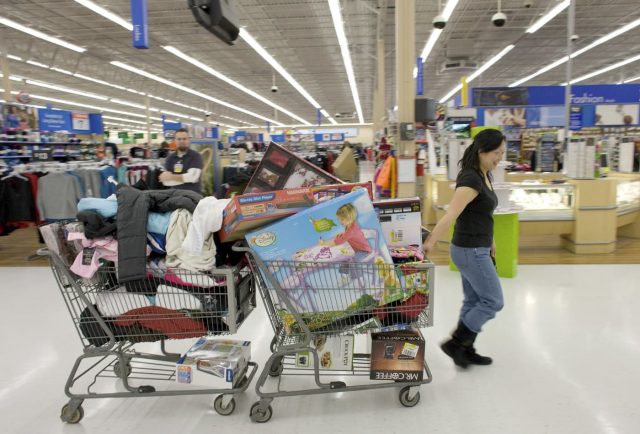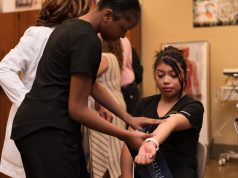By Auburn University
With the pandemic keeping many Americans away from brick-and-mortar stores, online shopping will be a big emphasis this year. Incentives such as free shipping, curbside pickup and delivery guarantees could help determine which retailers thrive, says Dora Bock, Auburn University associate professor of marketing. (Getty Images)
As the holiday shopping frenzy of Black Friday and Cyber Monday is upon us, what can brick-and-mortar stores and online retailers expect this season? Dora Bock, associate professor of marketing in Auburn University’s Harbert College of Business, comments on Nov. 27 Black Friday and Nov. 30 Cyber Monday sales predictions and trends.
Q: What will Black Friday 2020 look like?
Dora Bock: I think this year is going to be really different. In the past, you’ve seen retailers open on Thanksgiving Day or even later in the day on Thanksgiving, but this year, many big-box retailers like Walmart, Target and Best Buy have announced they will be closed on Thanksgiving Day. So you won’t see that after your Thanksgiving meal … the big rush to the store. Instead you’re going to see many more online sales. Certainly, consumers are going to be shopping from companies that share their same values. They’re going to be shopping at companies where they feel safe shopping there and companies that they trust.
In terms of spending, projections are a little mixed and certainly projections are just projections, but one survey has indicated that consumers are going to spend about $100 less per shopper. Overall holiday season spending may be lower, but there will likely be an increase in online spending. Unfortunately, because of the pandemic, many consumers have indicated that they’re not necessarily looking forward to the holiday season as much because either they’re grieving the loss of a loved one or they’re social distancing, so they’re not getting together with others, not going to holiday parties. There’s a lot of uncertainty in a lot of people who have lost jobs and are still recovering financially from some of the hurdles they’ve had to face this year. Overall, it’s going to be very different just because there’s going to be a clear push for online, but also there’s a lot of different emotions that consumers are currently experiencing now very different to what they have experienced in the past.
Q: What special incentives would you recommend retailers offer consumers to choose their product for online purchases?
Bock: There’s going to be a push or a lot of value, I would say, for consumers in the shipping of the purchases. So those that can exercise free shipping or those that can emphasize deals associated with buy online and pick up in-store, any way to sort of help or make the customer feel safe, that is likely going to be successful.
Q: How should the traditional brick-and-mortar retailers that remain open Thanksgiving Day compete against online retailers?
Bock: That’s tough, because a lot of times those local retailers don’t have the same capabilities as the big-box stores. So those local retailers that can provide shipping benefits to consumers, whether it’s they can drop them off at a consumer’s house or a certain location, or they can allow the customers to pick it up in-store or curbside service, can be helpful during this environment. Also, what’s key for many of these retailers is getting customers in the store because that’s where impulse purchases happen. Consumers are more likely to make an impulse purchase in the store, and people are really good at abandoning carts online. Those impulse purchases are what drive the bottom line for many traditional brick-and-mortar retailers.
If they can offer an in-store experience in which people feel safe … that can be beneficial probably for traditional brick-and-mortar retailers. Offering better deals can also be helpful. Price matching is one tactic that can help people drive or purchase locally versus purchasing online from another retailer. Ultimately, if they can do local pickup or somehow make the customer feel safe, that is likely going to prove to be beneficial because many customers right now actually want to shop locally because they’ve realized throughout this pandemic the importance of a local economy. Many people right now are trying to purchase from firms that share the same values. If stores can communicate their values and reach customers, that can be helpful in getting local consumers to support their business.
Q: How might Cyber Monday play into things?
Bock: Cyber Monday is going to play a huge role. People are certainly more comfortable with shopping online. This pandemic has shifted people into shopping from the convenience of their home and has certainly increased the number of online shoppers. In terms of sales, e-commerce is expected to be up or higher than last year. It’s estimated to be around $10 billion for Cyber Monday, which is a little higher. The increase is smaller than in the past, but this year carried a lot of uncertainty with it.
There are other changes, that retailers are spreading out their holiday deals this year. For instance, traditionally it’s been that Black Friday and Cyber Monday are two distinct days, but now, we’ve seen that this year there’s been more pre-Black Friday sales, which have already started. Amazon‘s annual Prime Day was typically, I believe, in July. It was pushed to October of this year. For many individuals, that Prime Day in October was the launch of the holiday season. To no surprise, if you look at some of the retailers, they’re already saying that they’re giving away Black Friday deals. Target, for instance, has already been offering new Black Friday deals weekly. Many stores have already just planned to space out the sales throughout the holiday season, rather than just rely or focus on those two days. The idea is that those two days are really getting blurred together now.
Q: What Black Friday trends should we expect?
Bock: We might see that people are turning toward traditional gifts or tangible gifts that you can touch rather than experiences, given the pandemic. In terms of trends, shipping is going to be a big deal. Some stores passively might not be able to offer guaranteed shipping, ultimately because of the COVID-related shipping delays. But you will see stores emphasize “buy online, pick up in stores,” or same-day pickup, and those sort of ways of getting the merchandise.
You also might see some really good discounts on airlines and cruise lines because travel has been really low. Certainly, there’s going to be deals on electronics, like in the past, but I do anticipate that we’ll see more travel-associated deals than in prior years.
Q: What types of retailers have an added advantage this season?
Bock: They would be retailers that can make customers feel safe and who have strong supply chains. And by that, I mean they have the ability to ship the product to the consumer and do so in a cost-efficient way. It ultimately comes down to those retailers that can quickly fulfill orders and ship them to consumers.
So it’s all about quick fulfillment and shipping. Also, offering a decent return policy in which if the size doesn’t fit or the shoe doesn’t fit, that they can easily return it. That’s why Nordstrom, which has one of the most lenient return policies, tends to score highly on the customer satisfaction index.
Q: What types of retailers might be at a disadvantage?
Bock: These would be retailers that cannot provide a safe shopping experience for consumers, and retailers that have not adapted to providing curbside pickup or other means of delivery than the traditional in-store shopping experience.
This story originally appeared on Auburn University’s website.





